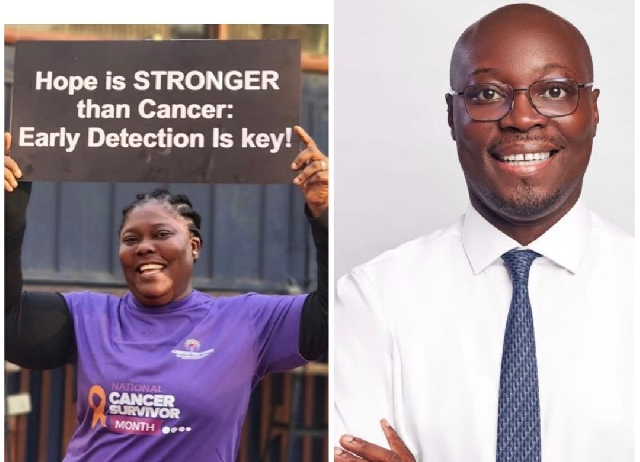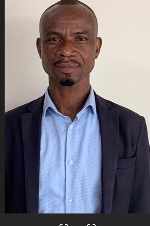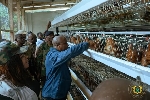Compassion in action: How Dr Cassiel Ato Forson became an unseen hero in Ramatu Sumani’s battle with cancer
 Dr Casiel Ato Forson
Dr Casiel Ato Forson
When 43-year-old breast cancer warrior Ramatu Sumani passed away earlier this year after a fierce relapse, few knew the quiet champion who stood by her side, then Minority Leader in Parliament and now Finance Minister, Dr Cassiel Ato Forson. Even in her final days, Ramatu “never stopped thanking and praying for him,” according to her close friend and fellow survivor, Raissa Sambou.
Ramatu’s story touches deeply not just because of her strength, but because of how Dr Forson’s discreet financial support kept her hope alive.
Her gratitude, shared through Raissa, has become a shining example among breast cancer survivors and advocates across Accra, earning the minister the affectionate title of “angel.”
Her loss was deeply felt by Raissa, who had become Ramatu’s confidante and strongest supporter in her second battle against the disease.
A fight shared, a friendship forged
Ramatu’s journey back to the community of survivors began when she reconnected with Raissa after first meeting her through a patient navigator at Korle Bu Teaching Hospital.
Raissa, a stage-three cancer survivor herself, had become one of her fiercest advocates.
The two women supported each other emotionally and in several other ways.
After completing her initial treatment, Ramatu remained cancer-free for four years.
But when the disease returned, the burden intensified: job losses, depleted savings, mounting medical bills.
It was during this relapse that Dr Forson stepped in, quietly covering critical hospital costs.
Ramatu never hid the depth of her appreciation: “He is indeed a compassionate person,” she frequently told friends.
Her unwavering faith and prayers for him became part of her identity until the end.
The statistics behind the struggle
Ramatu’s story isn’t unique in Ghana. Breast cancer remains one of the leading malignancies in the country, affecting women, accounting for roughly 4,400 new cases in 2020 and responsible for over 12% of female cancer deaths. Nearly 70% of women are diagnosed at advanced stages when treatment success is limited.
Survival rates remain low. One study in Eastern Ghana found only a 52% three-year survival rate. Across Western Africa, five-year survival ranges between 35% and 48%, compared to over 80% in high-income countries.
Delayed diagnosis, lack of national screening programmes, limited access to treatment, and more aggressive tumour types combine to erode outcomes.
Doctors are increasingly alarmed by rising breast cancer rates among younger Ghanaian women, many presenting too late. This trend underscores the urgent need for early detection, education, and systemic healthcare reforms.
The Mahama Care Policy: a bold step forward
President John Dramani Mahama’s newly launched Mahama Care Policy offers a fresh wave of hope for cancer patients and their families.
The initiative is designed to expand access to affordable cancer care by strengthening early detection programmes, subsidising diagnostic services, and ensuring chemotherapy and radiotherapy treatments are made more affordable for vulnerable patients.
For women like Ramatu, such a policy would have reduced the crushing financial weight that often makes treatment impossible to sustain.
Beyond care, it also commits to investing in rural health outreach, so women in remote areas are not left behind. Commendably, the president has shown leadership by recognising cancer as a national priority, and survivors across Ghana have welcomed this bold step as a long-overdue intervention that could save countless lives.
A message to the family
To Ramatu’s family, her passing is a painful loss that words can hardly capture.
Yet, in the midst of grief, there is pride to be found in the life she lived.
At just 43 years old, she poured herself into educating others about cancer, becoming a voice of encouragement to many, including her dear friend Raissa.
Though her years were fewer than hoped, God granted you the gift of sharing in her journey, her love, and her unshakable spirit. She fought bravely, cared deeply, and inspired widely.
Her sisters and close friends who stood with her can also take comfort knowing their support gave her strength when she needed it most.
May her memory remain a blessing, and may you find peace in knowing she gave her very best.
Personal loss; national imperative
For Raissa, Ramatu’s death was more than a personal tragedy, it was the loss of a sister-in-arms.
“She was passionate about breast cancer advocacy,” Raissa remembers.
“Even when she could not vote during the December 7 general elections, she kept praying that her absence would not affect the outcome.” Her faith was rewarded when the results aligned with her hopes, a bittersweet comfort.
Ramatu’s work as organiser of the Cancer Support Network Foundation saw her travelling into remote communities to educate women about cancer.
Her own mother had died from the disease, fueling her determination to change the narrative. Yet her final battle revealed how even committed advocates can fall through the cracks when the system fails to protect them.
A quiet hero: Dr Forson’s legacy of compassion
Dr Forson’s support was discreet, but the lasting impact of his gesture remains. Ghanaian survivors have come to see him as an “angel who touched Ramatu’s life.” His empathy, expressed without fanfare, cannot be doubted.
In an age where political capital often overshadows personal compassion, this act stands out. It is a reminder that leadership can be as much about humility as it is about authority.
May everyone find their own Dr Cassiel Ato Forson in times of need.
A tribute and a challenge
Ramatu Sumani’s life and final prayer for Dr Forson reflect the power of gratitude during hardship and the transformative potential of empathy in leadership.
Her passing at 43 is a loss to her son, to Raissa, to National Democratic Congress supporters, to cancer advocacy, and to all of Ghana.
Her legacy should not fade.
It should fuel action.
Because behind every statistic is a human life, and behind every survivor, a story worth telling loudly.
BY Rapheal Apetorbgor
Source: Classfmonline.com
Trending Features

Stop letting Maths and Science decide Ghana’s future
13:56
President Mahama’s agro-industrial revolution: Turning Ghanaian farms into business powerhouses
12:19
Laud Nartey: Growing unethical behaviour among bank staff- why BoG, GAB must scale up surveillance
07:02
Trapped in a cycle of danger: blood in the recycling factory
12:23
A new Africanism is rising: Why identity matters now
09:26
Kumasi High Court gripped by battle over Daddy Lumba’s widowhood rites
09:13
Drop in WASSCE 2025 performance – Reality check and opportunity for correction?
09:45



